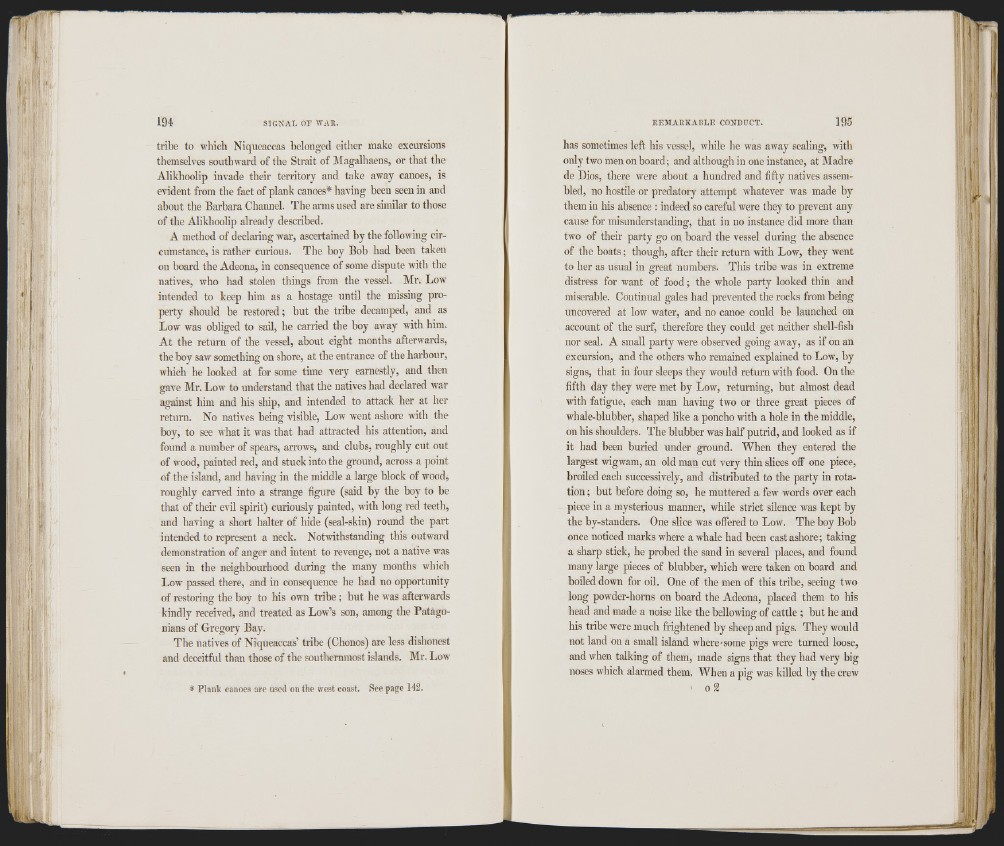
i r
194 SIGNAI. OF WAR.
tribe to which Niqueaccas belonged either make excursions
themselves southward of the Strait of Magalhaens, or that the
Alikhoolip invade their territory and take away canoes, is
evident from the fact of plank canoes* having been seen in and
about the Barbara Channel. The arms used are similar to those
of the Alikhoolip already described.
A method of declaring war, ascertained by the following circumstance,
is rather curious. The boy Boh had been taken
on board the Adeona, in consequence of some dispute with the
natives, who had stolen things from the vessel. Mr. Low
intended to keep him as a hostage until the missing property
should he restored; but the tribe decamped, and as
Low was obliged to sail, he carried the boy away with him.
At the return of the vessel, about eight months afterwards,
the boy saw something on shore, at the entrance of the harbour,
which he looked at for some time very earnestly, and then
gave Mr. Low to understand that the natives had declared war
against him and his ship, and intended to attack her at her
return. No natives being visible. Low went ashore with the
bo}', to see what it was that had attracted his attention, and
found a number of spears, arrows, and clubs, roughly cut out
of wood, painted red, and stuck into the ground, across a point
of the island, and having in the middle a large block of wood,
roughly carved into a strange figure (said by the boy to he
that of their evil spirit) curiously painted, with long red teeth,
and having a short halter of hide (seal-skin) round the part
intended to represent a neck. Notivithstanding this outward
demonstration of anger and intent to revenge, not a native was
seen in the neighbourhood during the many months which
Low passed there, and in consequence he had no opportunity
of restoring the boy to his own tribe ; hut he was afterwards
kindly received, and treated as Low’s son, among the Patagonians
of Gregory Bay.
The natives of Niqueaccas’ tribe (Chonos) are less dishonest
and deceitfid than those of the southernmost islands. Mr. Low
* Plank canoes are used on the west coast. See page 142.
REMARKABLE CONDUCT. 195
has sometimes left his vessel, wliile he was away sealing, with
only two men on board; and although in one instance, at Madre
de Dios, there were about a hundred and fifty natives assembled,
no hostile or predatory attempt whatever was made by
them in his absence : indeed so careful were they to prevent any
cause for misunderstanding, that in no instance did more than
two of their party go on board the vessel during the absence
of the boats; though, after their return with Low, they went
to her as usual in great numbers. This tribe was in extreme
distress for want of food; the whole party looked thin and
miserable. Continual gales had prevented the rocks from being
uncovered at low water, and no canoe could be launched on
account of the surf, therefore they could get neither shell-fish
nor seal. A small party were observed going away, as if on an
excursion, and the others who remained explained to Low, by
signs, that in four sleeps they would return with food. On the
fifth day they were met by Low, returning, but almost dead
with fatigue, each man having two or three great pieces of
whale-blubber, shaped like a poncho with a hole in the middle,
on his shoulders. The blubber was half putrid, and looked as if
it had been buried under ground. AVhen they entered the
largest wigwam, an old man cut very thin slices off one piece,
broiled each successively, and distributed to the party in rotation
; but before doing so, he muttered a few words over each
piece in a mysterious manner, while strict silence was kept by
the by-standers. One slice was offered to Low. The boy Bob
once noticed marks where a whale had been cast ashore; taking
a sharp stick, he probed the sand in several places, and found
many large pieces of blubber, which were taken on board and
boiled down for oil. One of the men of this tribe, seeing two
long powder-horns on board the Adeona, placed them to his
head and made a noise like the bellowing of cattle ; hut he and
his tribe were much frightened by sheep and pigs. They would
not land on a small island where »some pigs were turned loose,
and when talking of them, made signs that they had very big
noses which alarmed them. AVhen a pig was killed by the crew
o 2
;if’
ll
iQl dl-i. :.q.